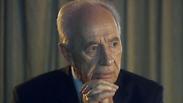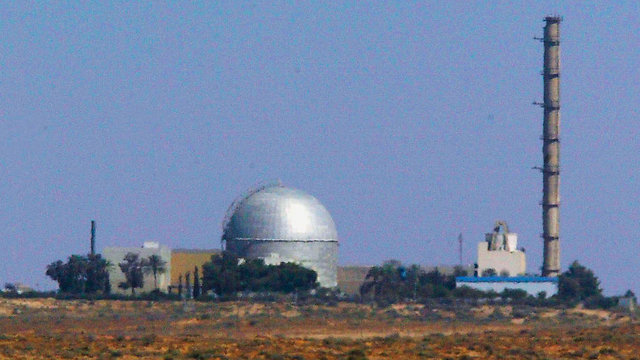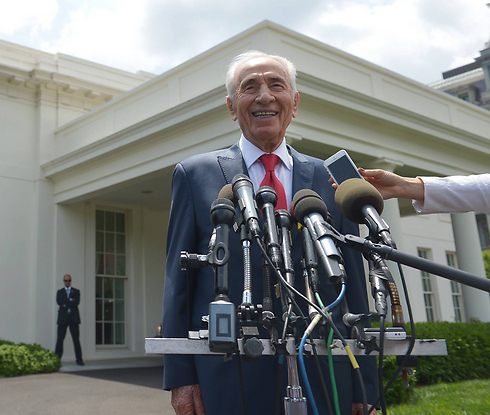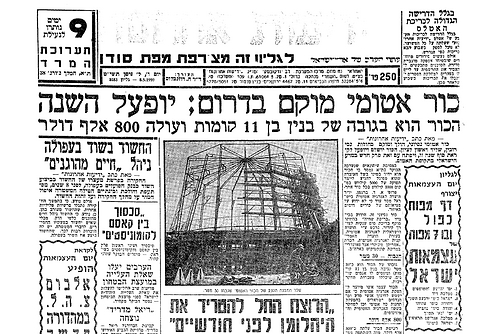
Former president Peres
Peres: Dimona reactor was first step to Oslo
In frank interview, Israeli icon recalls his many contributions to the Jewish State's nuclear weapons program, including creation of 'ambiguity' policy.
Exactly 11 years after the Declaration of Independence, on May 8, 1959, Yedioth Ahronoth printed a less-than-ordinary headline: "An atomic reactor is being built in the south; to become operational this year."
The report was about the nuclear reactor in Nahal Sorek, near Jerusalem. A year and a half later, on December 19, 1960, another vague report was printed: "Official American demand to produce details on atomic activity in Israel; a secret discussion was held in Washington following news of an Israeli atomic reactor near Be'er Sheva."
The report hinted about the construction of a secret nuclear reactor near Dimona, spearheaded by none other iconic Israeli statesman Shimon Peres.
"Ben-Gurion believed in nuclear energy," Peres says now. "At first we tried to get a nuclear reactor from America. In America they told us, 'without supervision, we have nothing to talk about.' President Eisenhower had an aid plan to use the nuclear reactor to create isotopes for medical purposes. Those who participated in the plan got $500,000 and a small reactor that was capable of producing several grams of enriched uranium."
Israel accepted the offer, Peres recalled: "We decided to take it and we built it in Nahal Sorek. But since we were against supervision, we build the additional reactor in Dimona at the same time –we did that with the French."
And then the Americans found out?
"What happened was that your journalists didn't turn to us officially for comment. When Yedioth Ahronoth reported on the American suspicions about the Dimona reactor, I was just in the United States on a security acquisition trip. Kennedy's aide, a Jew called Feldman, came to me and said, 'the President wants to see you.' But it wasn't customary for a president to meet with a deputy minister of another country, and Feldman stressed that Kennedy wants the meeting to be made through the back door, without publicity."
Peres remembered that fateful day in the White House. "I took (then) Ambassador Abe Herman with me and we climbed the steps to the back door. We came in the room; Kennedy was sitting on his rocking chair and started asking questions. Suddenly he asked, 'do you have nuclear weapons?' I told him, 'Mr. President, Israel will not be the first to bring nuclear weapons into the Middle East.' When we left, Ambassador Herman yelled at me, 'Who let you say such a thing?' I said, 'What do you want me to do? To tell Kennedy I was going to call (then prime minister) Eshkol and ask him?' Several weeks later it became the official Israeli policy. In my conversation with Kennedy, I outlined the 'nuclear ambiguity' policy."
Perhaps it's time we break free of this 'nuclear ambiguity' policy?
"What for? It was right then and it's right today. One time Amr Moussa, an Egyptian foreign minister who I was close to, came to me and said, 'Shimon, are we friends?' I said, 'Yes.' And he said, 'Take me to Dimona, let me see what's going on there.' I said, 'Have you gone crazy? If I take you to Dimona and you find out there's nothing there, you will no longer be afraid of us. What am I crazy? I want you to continue being afraid. This is the best deterrence."
How did you manage to recruit the French for the job?
"Ben-Gurion wasn't too excited about the French. Every French I brought to him he would ask, 'Why did you lose the war?' But he told me, 'Go to France.' We had a Polish agent in Paris called Stephen who took 10 percent from us for mediation. One day we came to him for dinner, he lived in a palace Napoleon built to his wife Joséphine. He lived with a beautiful Polish movie star, and served the food in golden dishes. I told him, '10 percent is a lot, we're a poor country.' And he said, 'I'm not taking this for myself, I'm paying a government official,' and gave me the name of the man. I called this man, introduced myself and asked to see him. We met and started working together."
And in Israel?
"At first everyone in Israel mocked me. I came to the Weizmann Institute and met with the management, I brought them in on the secret and they told me there was no chance, this was a fantasy and their scientists won't agree to participate. So I turned to the Technion, gathered a group of students in their final year of engineering and chemistry studies and sent them to continue their education in an intensive program in France. When the reactor went online, Amos de-Shalit, who was at the head of the Weizmann Institute, told his friends, 'In the name of intellectual integrity, we have to call Shimon and tell him he was right.'"
What kind of thoughts do you have today, when you're reading the first reports on the reactor's construction?
"We're the only nation in the world whose existence is under threat, and we're the only nation in the world who is not a threat to anyone. We needed to find a solution to that problem. I have no doubt the reactor gave Israel a dimension of deterrence. For me, Dimona was the first step to Oslo. It was built so we'll have the possibility to make peace."













